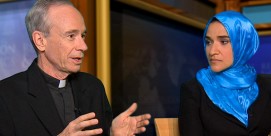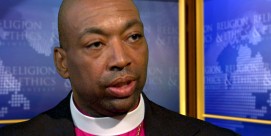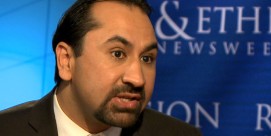Capital Punishment: Retribution or Justice?
BOB ABERNETHY (anchor): The fate of Oklahoma City bomber Timothy McVeigh has triggered a national debate over the death penalty in the religious communities. This week, more than 65 American religious leaders asked President Bush not to execute McVeigh and to impose a moratorium on all Federal executions.
Leaders of the Episcopal Church, Presbyterian Church USA, the United Church of Christ, Catholics Against Capital Punishment, the Quakers, and the Union of American Hebrew Congregations signed a letter stating the pain of McVeigh’s victims, of their community, and of the nation “cannot be healed through the retribution of capital punishment or by vengeance.”
Last week, speaking for the U.S. Catholic Bishops, Cardinals Roger Mahony of Los Angeles and William Keeler of Baltimore reiterated the Catholic Church’s longtime opposition to capital punishment, saying executing McVeigh will not bring healing or closure. Rather, the Cardinals said, “it will be just one more killing.”
At the same time, many religious leaders support McVeigh’s execution. Today, we have a special report on the capital punishment debate among people of faith. Our correspondent Tim O’Brien talked with two ministers in the same denomination, the First Christian Church [Disciples of Christ].
 TIM O’BRIEN: Although it has now been more than five years since Timothy McVeigh blew up the federal building in Oklahoma City, the demands that he pay for the crime with his life have not subsided — including from the clergy.
TIM O’BRIEN: Although it has now been more than five years since Timothy McVeigh blew up the federal building in Oklahoma City, the demands that he pay for the crime with his life have not subsided — including from the clergy.
REV. DON ALEXANDER (Senior Minister, First Christian Church [Disciples of Christ]): I personally support capital punishment because I believe that in our society, it really is the only way to undergird a system of moral accountability.
Reverend Don Alexander is the senior minister at the First Christian Church [Disciples of Christ] in Oklahoma City. On the day of the blast, his church was the disaster relief center for the families of the victims.
O’BRIEN: “Actions have consequences” reminds Alexander, and Timothy McVeigh must now compensate society for his horrendous crime.
(to Rev. Alexander): Why wouldn’t life in prison with no possibility of parole be sufficient compensation to make him recognize the wrongfulness of his conduct and live with it for a ripe old age, rotting in jail?
REV. ALEXANDER: The life or lives that have been taken with premeditation cannot be replaced; by the same token, we as a society cannot honor those lives, cannot reverence them, simply by putting a person away for the rest of their natural life.
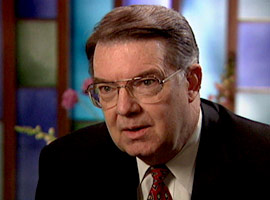 O’BRIEN: Why not?
O’BRIEN: Why not?
REV. ALEXANDER: Because it’s not compensational.
O’BRIEN: It’s not enough?
REV. ALEXANDER: It’s not enough.
O’BRIEN: But the nation’s churches, much like the rest of us, do not speak with one voice on capital punishment.
The Catholics say the circumstances that might justify the death penalty are “practically non-existent.” Southern Baptists insist capital punishment is not only allowed, but “divinely prescribed.” The United Methodist Church and the United Church of Christ disagree with the Southern Baptists. Reform and Conservative Judaism have long condemned capital punishment, yet Orthodox Jews insist that God commands execution for certain crimes. And Islam, the fastest growing major religion in the U.S., points to the Koran and Islamic tradition as evidence that Allah sanctions the death penalty.
Verity Jones is a senior minister of the same denomination as Donald Alexander — only her ministry is in Terre Haute, Indiana, just down the highway from the penitentiary where McVeigh is set to be executed. And her views on capital punishment are light years away from those of her counterpart in Oklahoma City.
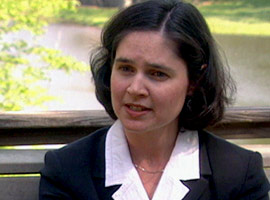 REV. VERITY JONES (Senior Minister, Central Christian Church [Disciples of Christ]): The problem with capital punishment is what it says about us. I do believe that Timothy McVeigh needs to be punished. He needs to be held accountable. As a society, we do need to judge him. As Christians, we judge him. And yet, I don’t think taking his life is the way to do that. Life in prison is a pretty awful punishment. We have taken his life there.
REV. VERITY JONES (Senior Minister, Central Christian Church [Disciples of Christ]): The problem with capital punishment is what it says about us. I do believe that Timothy McVeigh needs to be punished. He needs to be held accountable. As a society, we do need to judge him. As Christians, we judge him. And yet, I don’t think taking his life is the way to do that. Life in prison is a pretty awful punishment. We have taken his life there.
O’BRIEN: For years, the debate over capital punishment has focused on whether the death penalty deters others from taking human life. Many criminologists and sociologists say the evidence is inconclusive.
The McVeigh case, however, may have less to do with deterrence than with retribution and it raises a stark question: Whether retribution alone — revenge — is sufficient justification for the death penalty.
REV. JONES: As a nation, as a society, I believe that it demeans us. It puts us in a place of perpetuating a cycle of violence. Closure will never be found if vengeance and revenge continues to be the motivation.
O’BRIEN: The debate within the church mirrors the debate within society.
REV. ALEXANDER: I believe that our justice system is primarily based on a compensatory kind of model; if you look at the text, for instance, in the Hebrew scriptures Levicticus, “a life for a life, an eye for an eye, a tooth for a tooth, a burn for a burn.”
REV. JONES: Jesus, of course, then turns that around. He says you have heard “an eye for an eye.” I am paraphrasing here: “But I say turn the other cheek.” Jesus says we are to respond in a different kind of way.
O’BRIEN: The pending execution of Timothy McVeigh has wide public support, especially here in Oklahoma City; but that support has not translated into general support for capital punishment itself. In fact, half the states that have the death penalty — including Oklahoma — are now considering a moratorium on executions until questions about its fairness can be better addressed.
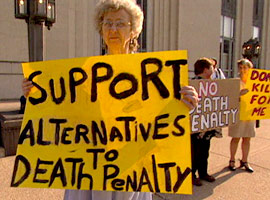 Factors such as race, poverty, and the quality of legal representation — which is often substandard — figure prominently in whether a defendant is sentenced to die. And as the evidence shows, from time to time, mistakes are made.
Factors such as race, poverty, and the quality of legal representation — which is often substandard — figure prominently in whether a defendant is sentenced to die. And as the evidence shows, from time to time, mistakes are made.
REV. ALEXANDER: We have to recognize how awful that is, that there are miscarriages of justice. But it seems to me that it’s an irreversible miscarriage of justice when a person continues to live after heinously and in a premeditated way, [has] taken a life or multiple lives — how is that not a miscarriage of justice?
O’BRIEN: The case of Timothy McVeigh is atypical. He had able lawyers. Yet many of the moral questions about capital punishment still resonate through his case.
(to Rev. Jones): You believe that all life is sacred?
REV. JONES: I do believe that all life is sacred, I do believe that all life is redeemed by Christ.
O’BRIEN: And one life cannot be more sacred than another life?
REV JONES: That’s right.
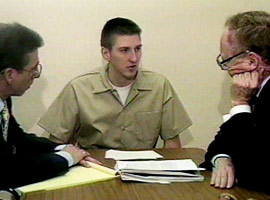 O’BRIEN: And the life of Timothy McVeigh is as sacred as the life of an innocent, five year old child?
O’BRIEN: And the life of Timothy McVeigh is as sacred as the life of an innocent, five year old child?
REV. JONES: In the eyes of God, I do not believe that one life is more sacred than another life.
O’BRIEN: If you had evidence that capital punishment is a strong deterrent, that by taking the killer’s life, you are saving somebody else’s life, would you still oppose it so vehemently?
REV. JONES: Yes, I would still oppose it because it is still our act of taking a life, it is still our act of getting in God’s way of reconciliation. God works in miraculous ways. God works in all kinds of ways that we can’t understand. For God, all things are possible.
O’BRIEN: Perhaps for God, but for some of us here on Earth, there is little hope for Timothy McVeigh. And if he somehow could find redemption?
(to Rev. Alexander): If you were to be persuaded that he has found Jesus and sought forgiveness, would you feel the same way?
 REV. ALEXANDER: I would be thankful that he had found a perspective that had broadened and deepened his sense of human community; but given our legal system and our societal structure, I think I would say he must be executed.
REV. ALEXANDER: I would be thankful that he had found a perspective that had broadened and deepened his sense of human community; but given our legal system and our societal structure, I think I would say he must be executed.
O’BRIEN: Notwithstanding the fact that he’s turned himself around?
REV. ALEXANDER: Yeah!
O’BRIEN: Because of compensation?
REV. ALEXANDER: Tough — yeah. Very difficult.
O’BRIEN: Timothy McVeigh is to be methodically put to death by lethal injection. Some 1,400 reporters have obtained government credentials for the execution, although only 10 will be permitted to actually watch. This will be the first federal execution, an execution on behalf of all Americans, in almost 40 years.
As theologians and others continue the debate over whether retribution is sufficient justification to take Timothy McVeigh’s life, officials at the penitentiary in Indiana — like the rest of us — are getting ready for it.
For Religion & Ethics NewsWeekly, I’m Tim O’Brien in Terre Haute, Indiana.
ABERNETHY: National polls disclose a sharp difference in attitudes about executing McVeigh and about capital punishment generally. According to the Pew Center for the People and the Press, the number of Americans who favor capital punishment in general is 66%. But when asked specifically about executing McVeigh, the number goes up to 75%.
Meanwhile, although big majorities do favor the death penalty, polls also show that support slowly going down, largely because of concerns about the fairness of its application.

